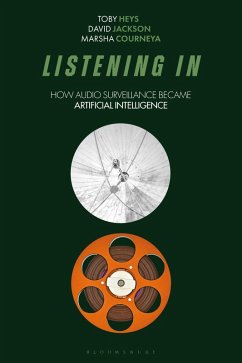In 1945, W. Averell Harriman, US Ambassador to the Soviet Union, was presented with a carved wooden plaque of the Great Seal of the United States as a 'gesture of friendship' by a delegation from the Soviet's Young Pioneer Organization. Unbeknownst to him, one of the first covert listening devices, invented by Leon Theremin was hidden within it and was subsequently used to listen in on the ambassador's conversations for six years before being discovered. This book uses remarkable tales like this to tell the story of how modern audio surveillance developed and its important role in the evolution of today's artificial intelligence. Beginning with post-WW2 monitoring devices, Listening In traces an arc through the Cold War era into the present day in which state and commercial spyware can record our calls, copy messages and secretly film us. It subsequently moves into the near future where AI-assisted technologies can listen to things we have not yet said as well as digitally simulate and record our voices after we have died. Exploring how mass audio surveillance is carried out through devices such as smart phones, speakers and baby monitors and used to inform and train AI algorithms, the book provides fresh insights into how we are allowing our personal privacies to be traded for enhanced social connectivity and technological convenience. Ultimately Listening In reveals how the urge to listen and record everything that has ever been uttered is scored deeply into the technological operating systems of cultures from around the world. Listening In is also available in audiobook format from audiobook retailers.
Bitte wählen Sie Ihr Anliegen aus.
Rechnungen
Retourenschein anfordern
Bestellstatus
Storno








